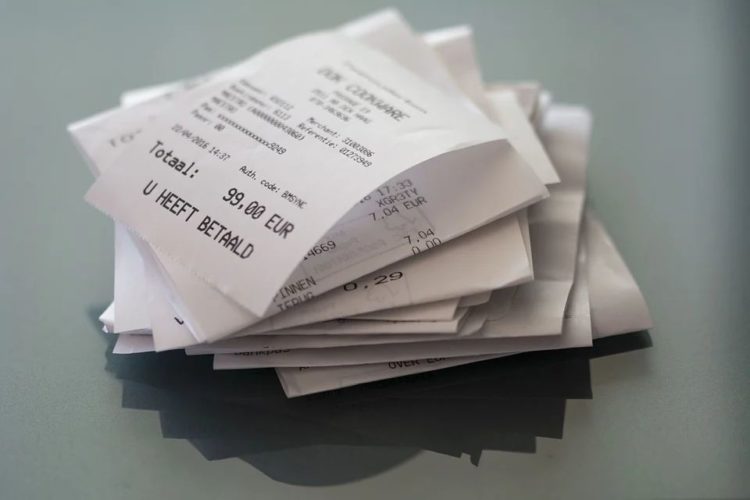Skin Absorbs Toxic Cash-Register-Receipt Chemical, Study Finds

Bisphenol A in receipts could be a major source of chemical exposure, a study suggests.
Some researchers investigating human exposure to the harmful chemical bisphenol-A, or BPA, believe that our biggest source of exposure is from food—probably because the chemical migrates into the food from its packaging or processing. Earlier this month, researchers found it in varying levels of most canned food tested, even Del Monte green beans. BPA has been linked to infertility, sperm damage, obesity, and heart disease, among other ills. Chemically tainted food is bad enough. But it’s looking like the amount of BPA found in our bodies is actually much higher than what’s found in food cans. So where is it coming from? One answer: the ubiquitous register receipts that we all handle whenever we make a purchase.
TABLE OF CONTENTS
All Recycled Paper Contains BPA
“These studies are starting to suggest that food might not be the major source of exposure. It’s plausible that exposures are coming from elsewhere, whether it’s thermal paper or some other environmental exposure we’re not aware of yet,” says Laura Vandenberg, PhD, postdoctoral fellow at the Center for Regenerative and Developmental Biology at Tufts University in Boston. (Thermal receipts contain a colorless, BPA-containing powder on one side. When heat from the printer strikes the paper, it turns the substance into ink that we can see.)
“It’s putting a tremendous pressure on consumers, particularly pregnant women who are worried about harmful chemicals, to be educated about stuff that chemists aren’t even educated on,” adds Vandenberg. “That’s ridiculous.”
BPA Absorbed Directly Through Skin
What chemists and other researchers are starting to understand is that BPA is in more things than we realize, and that there are different routes of exposure. A new study supporting that theory suggests that humans also absorb BPA through the skin even after handling cash-register receipts for just a few seconds. That’s bad news, since an Environmental Working Group report found that some receipts harbor BPA levels up to 1,000 times higher than BPA detected in the linings of metal cans.
Luckily, there are technologically savvy ways of getting around this problem.
Thermal cash-register receipts are the norm now, and many of them are coated with high levels of BPA. Researchers of this new study, published in the journal Analytical and Bioanalytical Chemistry, found BPA transferred from paper the skin after handling a receipt for just a few seconds. And the longer the hands went unwashed afterwards, the more researchers say was absorbed through the skin into the body. (Two hours after handing a receipt, nearly 75 percent of the BPA on the skin was gone, leading researchers to believe it was absorbed.) Interestingly, researchers found that when hands were greasy from body oils or other moisturizers, BPA transferred from receipt to skin was 10 times higher. And using an alcohol-based hand sanitizer increased absorption into the skin, so it’s not a good idea to use that to clean the chemical off after handling receipts.
BPA has been in the news so much lately that we all wish it would just go MIA. But until manufacturers collectively stop using it in food cans and packaging and stores stop issuing BPA-laced cash-register receipts we’ll likely continue to hear about its links to infertility, sperm damage, heart disease, obesity, and other problems. The good news is, entrepreneurs are already up and running with a paperless receipt idea. Places like Best Buy and The Container Store are using Intuit’s QuickReceipts system, which provides electronic receipts. Those customers also receive a paper copy. But systems such as Transaction Tree offer paperless options. Transaction Tree enables customers to look up and store paperless receipts through their email account or a Transaction Tree account; customers can call for a copy to be sent to their Smartphone if they need one later on.
How to Avoid BPA in Receipts:
• Avoid toxic receipts like the plague.
Complicating matters, an Environmental Working Group study found that when looking at chain stores, there doesn’t seem to be an across-the-board BPA-free policy. Chains in one region had receipts that contained BPA, while in another, the same chain’s franchises did not. When you order a simple coffee or everyday grocery order, you may want to just say you “don’t want a receipt”. At the gas pump and ATM machine (the receipts couldcontain BPA), you usually have the option to say no thanks to a receipt. If you need to take a receipt, store it in a folder or envelope, not in your wallet.
• Wash with soap and water.
Use regular soap and water (avoid toxic antibacterial soaps containing triclosan) after handling receipts. If you’re a cashier, push your manager to convert to paperless receipts, and until then, you may want to wear non-vinyl gloves to protect yourself.
• Pressure your favorite retailers to go with paperless receipts.
Although BPA-free receipt paper is available, it costs more. If retailers want to save money, they can forgo paper receipts altogether by choosing an electronic receipts system. Implementing paperless receipts gives companies a legit reason to say they’re going green.
